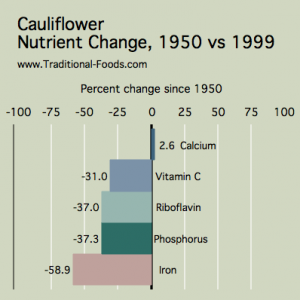by Catherine Haug, December 11, 2012
We all rely on the quality of our food to sustain us and keep us in good health. We trust that foods of vibrant color are rich in antioxidants and vitamins; for example, beets, oranges, carrots, cherries and berries. We trust that leafy greens with rich, dark color are rich in minerals, vitamins and bitters. We trust that fresh meats and dairy are rich in protein, essential oils, and vitamins.
But is our trust warranted? Certainly prior to the industrial age, that trust was well-placed. But modern agriculture is all about the bottom line, and food quality is often sacrificed in pursuit of that goal. Crops are treated with chemical fertilizers, pesticides and herbicides, and refreshed with contaminated waters. Animals are fed these inferior crops, and in many cases fed crops that are not their natural diet. All of this leads to nutritional deficiency in our foods.
Just how bad has it gotten? What can we do to reverse the trend?
 Nutrient Decline in our Food Supply
Nutrient Decline in our Food Supply
The Traditional Foods blog has a thought provoking article about the Nutrient Decline in the Food Supply, complete with great graphics from a USDA study for many different garden crops, that shows the percent change in nutrient levels between 1950 and 1999. This data is shocking, to say the least!
For example, the graphic for cauliflower, right. This shows a small increase in calcium but marked decreases for vitamin C, riboflavin, phosphorus and iron.
How can we reverse this decline?
The article offers the following suggestions:
- Grow your own organically, or buy from local growers you trust;
- Find produce grown from seed that was not developed for commercial production;
- When buying produce, shop for heirlooms;
- When buying garden seed, look for heirloom, non-hybridized, open-pollinated seed;
- if you grow your own, compost your garden.
And perhaps most importantly, share the knowledge, just as I am doing with this post. Encourage your local schools to nurture a garden and orchard. Volunteer at your local community garden to share your knowledge. And see the Traditional Foods: Gardening page for lots of great ideas and tips for specific crops.